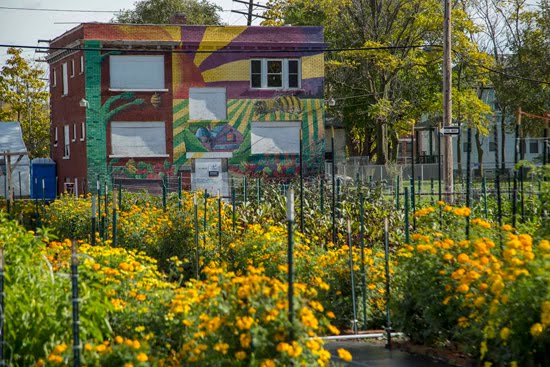Monday, December 23, 2019
Frank Lloyd Wright - the urban planner
"In this Our Changing Climate environmental video essay, I look at Frank Lloyd Wright's buildings through his sustainable and green architecture in his designs for Fallingwater and Usonian homes. Specifically, I dig into his ideas of organic architecture, Usonia, and Broadacre City, and look at buildings like Fallingwater in order to come to grips with the balance Frank Lloyd Wright strikes between a love for nature (and green living) and a desire for embracing new technologies."
Friday, September 6, 2019
Tuesday, August 27, 2019
6 Road Design Changes That Can Save Lives
"Six simple road design changes that can significantly improve road safety. These changes put people – not vehicles – at the center of design to reduce speeds, demand more awareness from drivers and create more opportunities for safe crossings. They can even help make cities greener.


1. Shorter Blocks
2. Narrower Lanes
2. Narrower Lanes
3. More Roundabouts
4. Chicanes (or bump outs)
5. Speed Humps
6. Raised Crossings
Bonus: Compact, Coordinated and Connected Planning
from:
6. Raised Crossings
Bonus: Compact, Coordinated and Connected Planning
from:
Friday, August 9, 2019
Video of the week
"Genius Inventions That Should be Implemented In Every City - Lots of ingenious inventions exist around the world. Let’s take a look at some genius inventions that should be implemented in every city."
Wednesday, August 7, 2019
Zoning 101

"Although invisible on land and inscrutable on paper, municipal zoning codes have a tremendous impact on the form of cities—and by extension, on the way people live in them. Today, these arcane regulations are seeing unprecedented levels of public scrutiny. After decades of embracing strict zoning rules, several cities and states want to relax them to make it easier to build housing and create more environmentally friendly communities. This edition of CityLab University offers an overview of zoning and defines the key terms related to it in America, so you can better understand the rules that are shaping your city and neighborhood."
from:
Friday, July 19, 2019
Shopping centre to downtown
"A new downtown is being built for Westminster, Colorado, a suburban city with no previous walkable downtown—on 105-acre former shopping mall site. Downtown Westminster will include 2,300 residential units with substantial affordable housing, and 1.7 million square feet of commercial uses—such as a grocery store, shops, restaurants, a movie theater, and office space. There will be 18 publicly accessible parks and civic spaces."
"The plan allows for the site to:
- Provide a pedestrian-oriented environment, with building-to-street relationships that foster an active, engaging pedestrian realm;
- Become the visual and physical center of the City of Westminster, with an urban form that reinforces the human scale and an urban environment; and a street-grid orientation that visually connects the site with prominent peaks of the Front Range;
- Provide an interconnected circulation network for vehicular, bicycle and pedestrian circulation including the re-routing of Westminster Boulevard through the site to become the ‘main street’ of the new Downtown;
- Connect the City’s green space system into the site with a multi-faceted public-space and park network;
- Ensure direct, convenient access to transit with facilitated access to the Downtown Westminster BRT station and a future Regional Transit District FasTracks rail station."
Wednesday, July 17, 2019
Chat Bench
"Have you seen our ‘Chat Bench’ in Burnham or Taunton? To help us tackle loneliness and isolation in the community we have introduced a ‘Chat Bench’ in Vivary Park in Taunton and also on Burnham Sea Front. Simply stopping to say "hello" to someone at the ‘Chat Bench’ could make a huge difference to the vulnerable people in our communities and help to make life a little better for them."

from:
https://www.washingtonpost.com/lifestyle/2019/07/17/this-towns-solution-loneliness-chat-bench


from:
https://www.washingtonpost.com/lifestyle/2019/07/17/this-towns-solution-loneliness-chat-bench

Monday, June 10, 2019
Community Design
from:
https://www.citylab.com/life/2019/05/having-library-or-cafe-down-block-could-change-your-life/589813
and:
Wednesday, May 29, 2019
Rethinking the design of goods

"There's a world of opportunity to re-think and re-design the way we make stuff. 'Re-Thinking Progress' explores how through a change in perspective we can re-design the way our economy works - designing products that can be 'made to be made again' and powering the system with renewable energy. It questions whether with creativity and innovation we can build a restorative economy."
"Innovation, quality and good design Cradle to Cradle® is a design concept that was developed in the 1990s by Prof. Dr. Michael Braungart, William McDonough and the scientists of EPEA in Hamburg. It stands for innovation, quality as well as good design and describes the safe and potentially infinite use of materials in cycles."

from:
https://epea-hamburg.com/cradle-to-cradle/
Friday, May 10, 2019
Ten great squares
"Squares are the outdoor living rooms of cities worldwide, and they have been planned at the center of the best North American cities for half of a millennium"
Friday, April 26, 2019
Sea level rise
Friday, April 19, 2019
Agrihoods
"The size, geography, and socioeconomic culture of agrihoods vary; they can be found in rural, suburban, and urban spaces, using diverse locations including housing built around existing farms or built into repurposed unused commercial or industrial spaces. The term “agrihood” itself is still fluid. “It hasn’t been well defined yet,” said Daron Joffe, a veteran farmer who has worked on a number of agrihoods and farm-centric communities in the U.S. “To me, an agrihood is a working farm that’s really connected to the residents, the local community outside the neighborhood, and connected to the larger region and foodshed.”
And while the definition is changing and growing, a report by the Urban Land Institute notes that agrihoods are “master planned or residential communities built with a working farm as a focus.” Rancho Mission Viejo, a housing developer and longtime ranching family in southern California, has even trademarked the term “agrihood” and applied it to their new Esencia development."
Subscribe to:
Comments (Atom)







